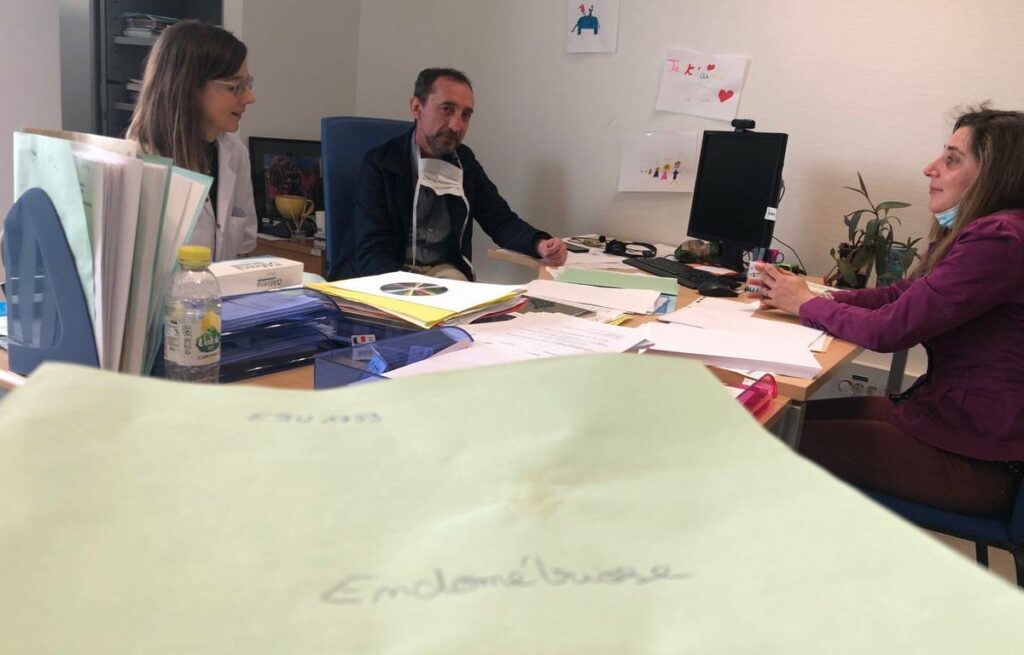From his first period, at the age of 10, Alisson Soum had pain. A suffering that increased throughout his adolescence until he was told at the age of 19 that it was endometriosis. “I didn’t know what it was. They had me do ultrasounds and the next day they removed a 9 cm cyst, ”recalls this Toulouse woman, now 29 years old. Since then, she has undergone nine operations, at the level of the ovaries, the rectum but also the tubes.
A long fight that she leads against this disease sometimes invisible to the eyes of others. “For some it is still a disease in the head. It generates a lot of absenteeism, I have lost several jobs because of it and in the life of a couple, it is a disease that weighs a lot”, testifies the young woman who dreams of waking up one day without this sword of Damocles. above the head. For some time, she has been followed by a multidisciplinary team from the Toulouse University Hospital.
Supported from A to Z
An innovative care pathway that allows patients to benefit from comprehensive care as part of a pathway called “Fast-Track”. “We are trying to make the patient’s journey more fluid. She will have easier access to treatment by a specialized gastroenterologist if she has digestive problems, to an expert radiologist, a urologist, a psychologist and even thoracic surgery if necessary. It is adapted and individualized care from A to Z. Everything goes through a nurse who will coordinate and facilitate access to appointments, ”explains Elodie Chantalat, gynecological surgeon specializing in this pathology which affects 10% of women. in France.
Among them, 75% have chronic pain that disables them until their menopause, sometimes even beyond. Of these affected women, 40% will struggle to have children.
From the first appointment at the CHU, examinations will be carried out which will make it possible to guide the best possible care of the patient, whether surgical or medicinal. “Our goal is to preserve fertility at all costs because not all patients are infertile. We must explore everything before surgery and go beyond this only solution to remove the disease. Global support is the best way. The first appointment is an important listening time, sometimes it will direct us to the location of the symptoms”, continues Yann Tanguy Le Gac, another obstetric surgeon who is part of this multidisciplinary team.
Consideration of patient opinions
For the most complex cases, a multidisciplinary consultation meeting takes place every month. Its members study an average of sixty cases there, always with the same objective of improving the quality of life of patients and doing everything possible to shorten the time taken for treatment. Because it happens that the lesions are there, but the suffering is less. “We are not dealing with images but with symptoms over time,” insists Yann Tanguy Le Gac. This approach has made it possible to observe a reduction in postoperative complications, but also a well-being of the women followed.
Patients who have a say in decision-making. Because a hormonal drug will have an impact on libido, mood or even weight. Alisson lived it all. “It is an unpredictable disease, there are treatments that provide relief even if there is no cure. When you have a crisis you have to accept the pain and work on it, I use breathing, I do yoga and meditation, ”explains the young woman who advises not to remain alone in the face of the disease.
Create a network for a better diagnosis
And who is fighting for better care by general practitioners. She took nine years to be diagnosed, her general practitioner treating her until then with painkillers. In coordination with the other centers specializing in endometriosis, the actors of the “Fast Track” course of the Toulouse University Hospital are working on setting up a network in order to create a territorial network.
« When a woman says she has a sore shoulder during her period, we think she’s crazy. There is often a diagnostic error due to ignorance of the disease. To shorten treatment times, we want to set up a network, information brochures, so that general practitioners know who to contact », suggests doctor Elodie Chantalat who hopes to see this project come to fruition soon, in partnership with the medical profession but also very active patient associations. A project that could be one of the responses to the national strategy mentioned in January by Emmanuel Macron which made endometriosis a public health issue.

